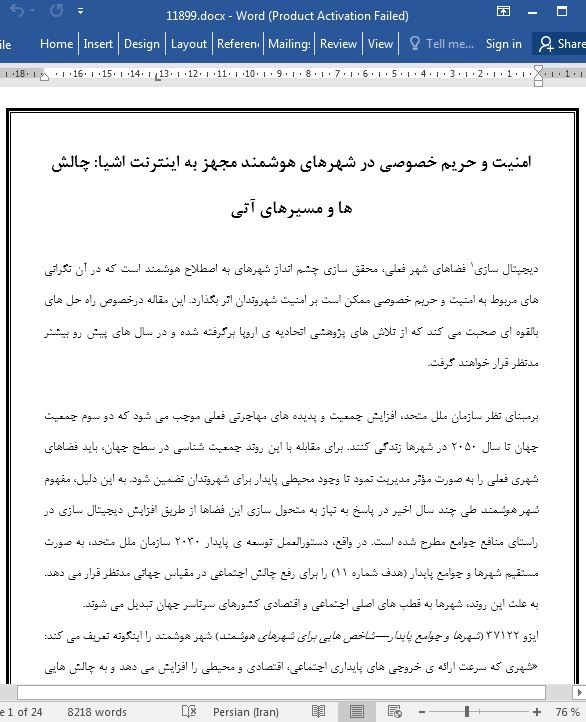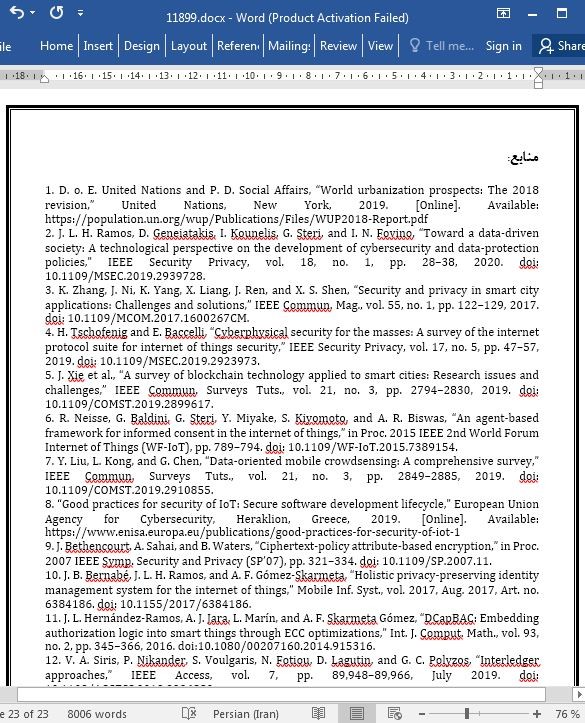
امنیت و حریم خصوصی در شهرهای هوشمند مجهز به اینترنت اشیا
دیجیتال سازی فضاهای شهر فعلی، محقق سازی چشم انداز شهرهای به اصطلاح هوشمند است که در آن نگرانی های مربوط به امنیت و حریم خصوصی ممکن است بر امنیت شهروندان اثر بگذارد. این مقاله درخصوص راه حل های بالقوه ای صحبت می کند که از تلاش های پژوهشی اتحادیه ی اروپا برگرفته شده و در سال های پیش رو بیشتر مدنظر قرار خواهند گرفت.
برمبنای نظر سازمان ملل متحد، افزایش جمعیت و پدیده های مهاجرتی فعلی موجب می شود که دو سوم جمعیت جهان تا سال 2050 در شهرها زندگی کنند. برای مقابله با این روند جمعیت شناسی در سطح جهان، باید فضاهای شهری فعلی را به صورت مؤثر مدیریت نمود تا وجود محیطی پایدار برای شهروندان تضمین شود. به این دلیل، مفهوم شهر هوشمند طی چند سال اخیر در پاسخ به نیاز به متحول سازی این فضاها از طریق افزایش دیجیتال سازی در راستای منافع جوامع مطرح شده است. در واقع، دستورالعمل توسعه ی پایدار 2030 سازمان ملل متحد، به صورت مستقیم شهرها و جوامع پایدار (هدف شماره 11) را برای رفع چالش اجتماعی در مقیاس جهانی مدنظر قرار می دهد. به علت این روند، شهرها به قطب های اصلی اجتماعی و اقتصادی کشورهای سرتاسر جهان تبدیل می شوند.
تحلیل و مسیرهای پژوهشی آتی
تحقق امنیت و حریم خصوصی شهرهای هوشمند مجهز به اینترنت اشیا مستلزم انجام تلاش های هماهنگ است که چالش های فنی، اجتماعی و قانونی را برطرف می کند. مفهوم شهر هوشمند در سطح جهان توجه زیادی را به خود جلب کرده است. علاوه بر برنامه ی جهانی شهرهای هوشمند متحد و طرح ابتکاری مشارکت نوآوری اروپا در شهرها و جوامع هوشمند در سطح اتحادیه ی اروپا، تلاش های دیگری اخیراً انجام شده اند که عبارتند از: مشارکت در تحول دیجیتال دستورالعمل شهری برای اتحادیه ی اروپا و طرح ابتکاری شهرهای دیجیتال که اخیراً در برنامه ی 100 چالش شهر دیجیتال مطرح شده اند.
The digitalization of current urban spaces is realizing the vision of so-called smart cities, where security and privacy concerns could affect citizens’ safety. This work discusses potential solutions derived from European Union research efforts to be considered in the coming years.
According to the United Nations (UN), the increase in population and current migratory phenomena will cause two thirds of the world’s population to live in cities by 2050.1 To cope with this global demographic trend, current urban spaces need to be efficiently managed to guarantee a sustainable environment for citizens. For this reason, the concept of a smart city emerged a few years ago in response to the need to transform these spaces through an increase of digitalization for the benefit of our societies. In fact, the UN’s 2030 Agenda for Sustainable Development explicitly considers Sustainable Cities and Communities (Goal 11) to address this social challenge on a global scale. Because of this trend, cities are becoming the main social and economic hubs of countries around the world.
Analysis and Future Research Directions
The realization of secure and privacy-aware IoT-enabled smart cities requires coordinated efforts addressing technical, social, and legal challenges. The concept of the smart city has attracted a strong interest worldwide. In addition to the United Smart Cities global program and the EIP-SCC initiative at the EU level, other efforts have been recently created, such as the Digital Transition Partnership of the Urban Agenda for the EU and the Digital Cities initiative, which has recently evolved into the 100 Intelligent Cities Challenge program.
الزامات امنیت و حریم خصوصی در شهرهای هوشمند مجهز به اینترنت اشیا
ارتباطات ایمن برای دستگاه ها و شبکه هایی که محدودیت منابع دارند
استقرار خودکار و ایمن دستگاه های اینترنت اشیا
ارزیابی امنیتی پیوسته
اشتراک داده شفاف و غیرمتمرکز
مدیریت کنترل دسترسی و رضایت آگاهانه
گمنام سازی داده های شخصی
تحلیل داده مبتنی بر حفظ حریم خصوصی
قالب های داده ی تعامل پذیر و ایمن
اجرای مقررات فعلی امنیت و حریم خصوصی
آگاهی از امنیت سایبری
معماری مرجع برای شهرهای هوشمند مجهز به اینترنت اشیا آگاه از مشکلات امنیت و حریم خصوصی
رویکرد SynchroniCity
تشریح مؤلفه های SynchroniCity
پیاده سازی امنیت و حریم خصوصی در شهرهای هوشمند: مطالعه ی موردی می موریکا
تحلیل و مسیرهای پژوهشی آتی
منابع
Security and Privacy Requirements in IoTEnabled Smart Cities
Secure Communications for ResourceConstrained Devices and Networks
Automated and Secure Deployment of IoT Devices
Continuous Security Assessment
Transparent and Decentralized Data Sharing
Access Control Management and Informed Consent
Anonymization of Personal Data
Privacy-Preserving Data Analytics
Interoperable and Secure Data Formats
Enforcement of Current Security and Privacy Regulations
Cybersecurity Awareness
A Reference Architecture for Secure and Privacy-Aware IoT-Enabled Smart Cities
The SynchroniCity Approach
Instantiating SynchroniCity Components
Deploying Security and Privacy in Smart Cities: The Case of MiMurcia
Analysis and Future Research Directions
References
- اصل مقاله انگلیسی با فرمت ورد (word) با قابلیت ویرایش
- ترجمه فارسی مقاله با فرمت ورد (word) با قابلیت ویرایش، بدون آرم سایت ای ترجمه
- ترجمه فارسی مقاله با فرمت pdf، بدون آرم سایت ای ترجمه



